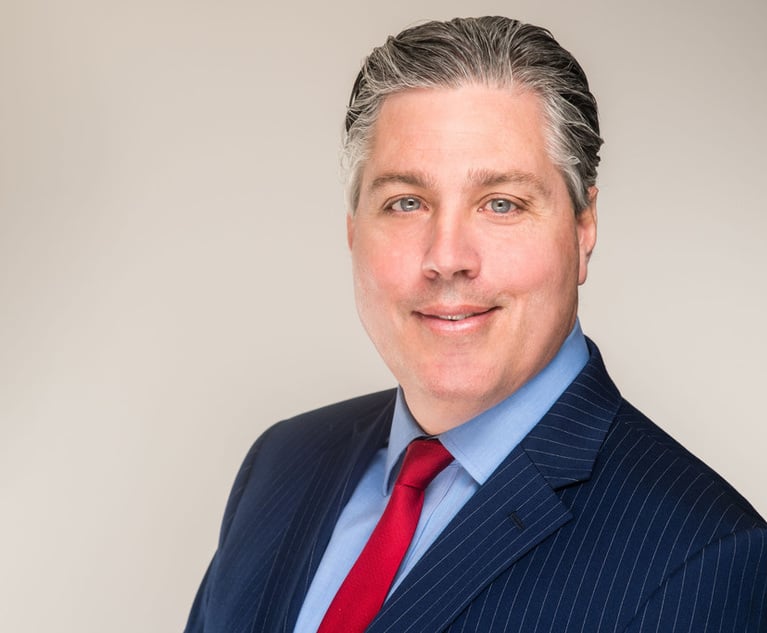Despite 'Serious Misgivings,' Court Says It's Bound by Its Own Auto Insurance Precedent
The Pennsylvania Superior Court said that, despite "serious reservations" about a prior appeals panel's analysis, it was bound by the panel's ruling to find that an employee is covered under his employer's insurance for an accident that occurred while he was using his own vehicle in the scope of his employment.
March 19, 2020 at 03:05 PM
5 minute read
 Photo: Shutterstock
Photo: Shutterstock
In reluctantly affirming a trial judge's ruling that an employee was covered under his employer's insurance policy for an accident he got into while using his own vehicle for a company errand, the Pennsylvania Superior Court said it was constrained by its own precedent to disregard an analysis of whether the vehicle was "'borrowed'" by the employer and therefore excluded from coverage.
In a nonprecedential March 3 opinion in Olson v. State Auto Property and Casualty Insurance, a three-judge appeals panel upheld a Beaver County trial court's ruling that Michael Sayre, a defendant in a motor vehicle accident case brought by plaintiffs Donna and Dennis Olson, was covered under his employer International Titanium Corp.'s policy with State Auto Property and Casualty Insurance Co.
Donna Olson alleged she was injured in an auto accident with Sayre while Sayre was using his own vehicle to pick up mail for International, where he worked as general manager, according to the opinion by Judge Judith Ference Olson.
Both Olson and Sayre argued that, because Sayre was using his own vehicle in the course of his employment, Sayre should be covered under International's policy and then-Beaver County Court of Common Pleas Judge Deborah Kunselman (now a Superior Court judge) agreed.
Olson, joined by Judges Jacqueline Shogan and Kate Ford Elliott, said the question of whether Sayre was covered under International's policy hinged on whether Sayre's vehicle was "'borrowed'" by International under the policy terms.
Olson pointed to Section II(A)(1) of the State Auto policy, which states that, in addition to the policyholder, "insureds" include "anyone else while using with your permission a covered 'auto' you own, hire or borrow except: … 2) Your employee if the covered 'auto' is owned by that employee or a member of his or her household."
The policy does not define "borrow," but Merriam-Webster defines "borrow" to mean "'to receive with the implied or expressed intention of returning the same or an equivalent'" and Black's Law Dictionary defines it as "'tak[ing] something for temporary use,'" Olson said.
Olson said the record reflects that Sayre often used his work vehicle to run company errands.
"Notably, Sayre also testified that, when he performed such duties, he would submit 'receipts for gas and some repairs to his vehicle' and would, in turn, be 'reimbursed by [International],'" Olson noted. "When considering these facts, it is relatively clear that, at the time of the accident, International temporarily utilized Sayre's vehicle with the implied intention of returning it."
Olson said that, under similar circumstances, courts in Iowa, New Jersey and California have all reached the conclusion that an employee's vehicle was "borrowed" for the purposes of determining coverage.
"Notwithstanding legal precedents applying the common definition of 'borrow,' the trial court held that 'Sayre's automobile was not a borrowed vehicle at the time of the accident,'" Olson said of Kunselman's ruling. "In reaching this conclusion, the court apparently rejected the notion that an employee can 'borrow' his own vehicle. We note, however, that this determination is at odds with the aforementioned case law applying the definition of 'borrow' to similar facts. Indeed, the fact that International reimbursed Sayre for gas and vehicle repairs strongly suggests that International 'borrowed' Sayre's vehicle when he used it for company errands."
Regardless, however, Olson said the panel was bound to affirm Kunselman's opinion by another Superior Court panel's 1996 ruling in Bamber v. Lumbermens Mutual Casualty.
In that case, the panel examined a policy that was nearly identical to the one at issue in Sayre's case, Olson said. But the Bamber court, in finding that a U.S. Chamber of Commerce employee was entitled to coverage under his employer's policy, relied entirely on the provision that defined covered "nonowned 'autos'" as "only those 'autos' you do not own, lease, hire, rent or borrow that are used in connection with your business. This includes 'autos' owned by your employees or partners or members of their households but only while used in your business or your personal affairs."
The Bamber court failed to engage in any analysis of whether the employee's vehicle was owned, leased or borrowed by the employer, Olson said. If it had, it may have concluded that the employee was not covered under the policy.
"Pursuant to Bamber, an employee using his or her own vehicle during the course and scope of employment is using a 'covered auto' and is an 'insured,'" Olson said. "We have serious misgivings about Bamber's interpretation of the Chamber's policy and its application thereof."
Nevertheless, Olson conceded that the panel in Sayre was bound by the Bamber decision until the Superior Court decides to grant en banc review of the issue.
Counsel for State Auto and International, Eric Anderson of Meyer, Darragh, Buckler, Bebenek & Eck, in Pittsburgh, said in an email, "It is apparent form a reading of the Superior Court's opinion that the panel agreed with the position I argued in the trial court, but to which the trial court disagreed. However, as you notice from the Superior Court's opinion, it decided that it could not overrule another panel's prior decision even though it felt that the prior panel's decision may be erroneous. The Superior Court subtly suggested that the appellant, State Auto, file a petition for reargument before the Superior Court en banc, which has been done."
Counsel for Sayre, Robert O'Connell of Robb Leonard Mulvihill in Pittsburgh, and counsel for the Olsons, Kenneth Fawcett of Bowers Fawcett & Hurst in Ambridge, could not be reached for comment.
This content has been archived. It is available through our partners, LexisNexis® and Bloomberg Law.
To view this content, please continue to their sites.
Not a Lexis Subscriber?
Subscribe Now
Not a Bloomberg Law Subscriber?
Subscribe Now
NOT FOR REPRINT
© 2025 ALM Global, LLC, All Rights Reserved. Request academic re-use from www.copyright.com. All other uses, submit a request to [email protected]. For more information visit Asset & Logo Licensing.
You Might Like
View All


Feasting, Pledging, and Wagering, Philly Attorneys Prepare for Super Bowl
3 minute read
TikTok Opts Not to Take Section 230 Immunity Fight to U.S. Supreme Court
4 minute readLaw Firms Mentioned
Trending Stories
- 1States Accuse Trump of Thwarting Court's Funding Restoration Order
- 2Microsoft Becomes Latest Tech Company to Face Claims of Stealing Marketing Commissions From Influencers
- 3Coral Gables Attorney Busted for Stalking Lawyer
- 4Trump's DOJ Delays Releasing Jan. 6 FBI Agents List Under Consent Order
- 5Securities Report Says That 2024 Settlements Passed a Total of $5.2B
Who Got The Work
J. Brugh Lower of Gibbons has entered an appearance for industrial equipment supplier Devco Corporation in a pending trademark infringement lawsuit. The suit, accusing the defendant of selling knock-off Graco products, was filed Dec. 18 in New Jersey District Court by Rivkin Radler on behalf of Graco Inc. and Graco Minnesota. The case, assigned to U.S. District Judge Zahid N. Quraishi, is 3:24-cv-11294, Graco Inc. et al v. Devco Corporation.
Who Got The Work
Rebecca Maller-Stein and Kent A. Yalowitz of Arnold & Porter Kaye Scholer have entered their appearances for Hanaco Venture Capital and its executives, Lior Prosor and David Frankel, in a pending securities lawsuit. The action, filed on Dec. 24 in New York Southern District Court by Zell, Aron & Co. on behalf of Goldeneye Advisors, accuses the defendants of negligently and fraudulently managing the plaintiff's $1 million investment. The case, assigned to U.S. District Judge Vernon S. Broderick, is 1:24-cv-09918, Goldeneye Advisors, LLC v. Hanaco Venture Capital, Ltd. et al.
Who Got The Work
Attorneys from A&O Shearman has stepped in as defense counsel for Toronto-Dominion Bank and other defendants in a pending securities class action. The suit, filed Dec. 11 in New York Southern District Court by Bleichmar Fonti & Auld, accuses the defendants of concealing the bank's 'pervasive' deficiencies in regards to its compliance with the Bank Secrecy Act and the quality of its anti-money laundering controls. The case, assigned to U.S. District Judge Arun Subramanian, is 1:24-cv-09445, Gonzalez v. The Toronto-Dominion Bank et al.
Who Got The Work
Crown Castle International, a Pennsylvania company providing shared communications infrastructure, has turned to Luke D. Wolf of Gordon Rees Scully Mansukhani to fend off a pending breach-of-contract lawsuit. The court action, filed Nov. 25 in Michigan Eastern District Court by Hooper Hathaway PC on behalf of The Town Residences LLC, accuses Crown Castle of failing to transfer approximately $30,000 in utility payments from T-Mobile in breach of a roof-top lease and assignment agreement. The case, assigned to U.S. District Judge Susan K. Declercq, is 2:24-cv-13131, The Town Residences LLC v. T-Mobile US, Inc. et al.
Who Got The Work
Wilfred P. Coronato and Daniel M. Schwartz of McCarter & English have stepped in as defense counsel to Electrolux Home Products Inc. in a pending product liability lawsuit. The court action, filed Nov. 26 in New York Eastern District Court by Poulos Lopiccolo PC and Nagel Rice LLP on behalf of David Stern, alleges that the defendant's refrigerators’ drawers and shelving repeatedly break and fall apart within months after purchase. The case, assigned to U.S. District Judge Joan M. Azrack, is 2:24-cv-08204, Stern v. Electrolux Home Products, Inc.





